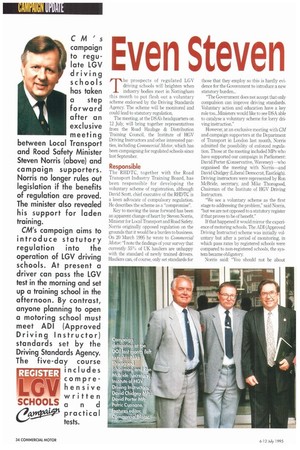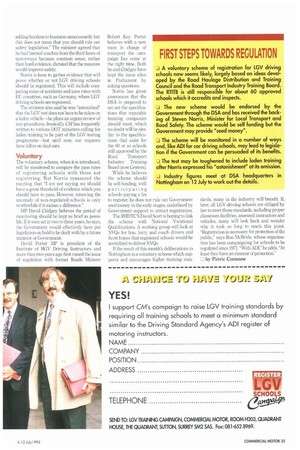Even Steven
Page 46

Page 47

If you've noticed an error in this article please click here to report it so we can fix it.
The prospects of regulated LGV driving schools will brighten when industry bodies meet in Nottingham this month to put flesh out a voluntary scheme endorsed by the Driving Standards Agency. The scheme will be monitored and could lead to statutory regulation.
The meeting, at the DSA's headquarters on 12 July. will bring together representatives from the Road Haulage & Distribution Training Council, the Institute of HGV Driving Instructors and other interested parties, including Commercial Motor, which has been campaigning for regulated schools since last September.
Responsible
The RHDTC, together with the Road Transport Industry Training Board, has been responsible for developing the voluntary scheme of registration, although David Scott, chief executive of the RIADTC is a keen advocate of compulsory regulation. He describes the scheme as a "compromise".
Key to moving the issue forward has been an apparent change of heart by Steven Norris, Minister for Local Transport and Road Safety Norris originally opposed regulation on the grounds that it would be a burden to business. On 20 March 1995 he wrote to Commercial Motor: "I note the findings of your survey that currently 550/0 of UK hauliers are unhappy with the standard of newly trained drivers. Hauliers can, of course, only set standards for
those that they employ so this is hardly evidence for the Government to introduce a new statutory burden„.
"The Government does not accept that only compulsion can improve driving standards. Voluntary action and education have a key role too...Ministers would like to see DSA able to catalyse a voluntary scheme for lorry driving instruction."
However, at an exclusive meeting with CM and campaign supporters at the Department of Transport in London last month, Norris admitted the possibility of enforced regulation. Those at the meeting included MPs who have supported our campaign in Parliament: David Porter (Conservative, Waveney)—who organised the meeting with Norris—and David Chidgey (Liberal Democrat, Eastleigh). Driving instructors were represented by Ron McBride, secretary, and Mike Thorogood, Chairman of the Institute of HGV Driving Instructors.
"We see a voluntary scheme as the first stage to addressing the problem," said Norris, "but we are not opposed to a statutory register if that proves to be of benefit."
If that happened it would mirror the experience of motoring schools. The AD! (Approved Driving Instructor) scheme was initially voluntary but after a period of monitoring, in which pass rates by registered schools were compared to non.registered schools, the system became obligatory.
Norris said: "You should not be about adding burdens to business unnecessarily but this does not mean that you should rule out safety legislation." The minister agreed that he Had banned coaches from the third lanes of motorways because common sense, rather than hard evidence, dictated that the measure would improve safety Norris is keen to gather evidence that will prove whether or not LGV driving schools should be registered. This will include comparing rates of accidents and pass rates with EU countries, such as Germany, where LGV driving schools are registered.
The minister also said he was "astonished" that the LGV test does not have to be taken on a laden vehicle—he plans an urgent review of test procedures. Ironically CM has frequently written to various DOT ministers calling for laden training to be part of the LGV testing programme—but until now, our requests have fallen on deaf ears.
Voluntary
The voluntary scheme, when it is introduced, will be monitored to compare the pass rates of registering schools with those not registering. But Norris reassured the meeting that "I am not saying we should have a great threshold of evidence which you should have to pass. However, removing the anomaly of non-regulated schools is only worthwhile if it makes a difference."
MP David Chidgey believes the period of monitoring should be kept as brief as possible. If it were set at two to three years, he says, the Government would effectively have put legislation on hold to be dealt with by a future minister or Government.
David Porter MP is president of the Institute of HGV Driving Instructors and more than two years ago first raised the issue of regulation with former Roads Minister Robert Key. Porter believes with a new team in charge of transport the campaign has come at the right time. Both he and Chidgey have kept the issue alive in Parliament by asking questions.
Norris has given assurances that the DSA is prepared to set out the specifications that reputable training cotnpanies should meet, which no doubt will be similar to the specifications that exist for the 60 or so schools still approved by the Road Transport Industry Training Board (now Centrex).
While he believes the scheme should be self-funding, with participating schools paying a fee to register, he does not rule out Government seed money in the early stages, underlined by Government support to attract registration.
The RHDTC'S David Scott is hoping to link the scheme with National Vocational Qualifications. A working group will look at NVQ8 for bus, lorry and coach drivers and Scott hopes that registered schools would be accredited to deliver NVQs.
If the result of this month's deliberations in Nottingham is a voluntary scheme which supports and encourages higher training stan
dards, many in the industry will benefit. If, later, all LGV driving schools are obliged by law to meet those standards, including proper classroom facilities, assessed instructors and vehicles, many will look back and wonder why it took so long to reach this point. "Registration is necessary for protection of the public," says Ron McBride, whose organisation has been campaigning for schools to be regulated since 1971. "With ADI," he adds, "At least they have an element of protection."
by Patric Cunnane




































































































